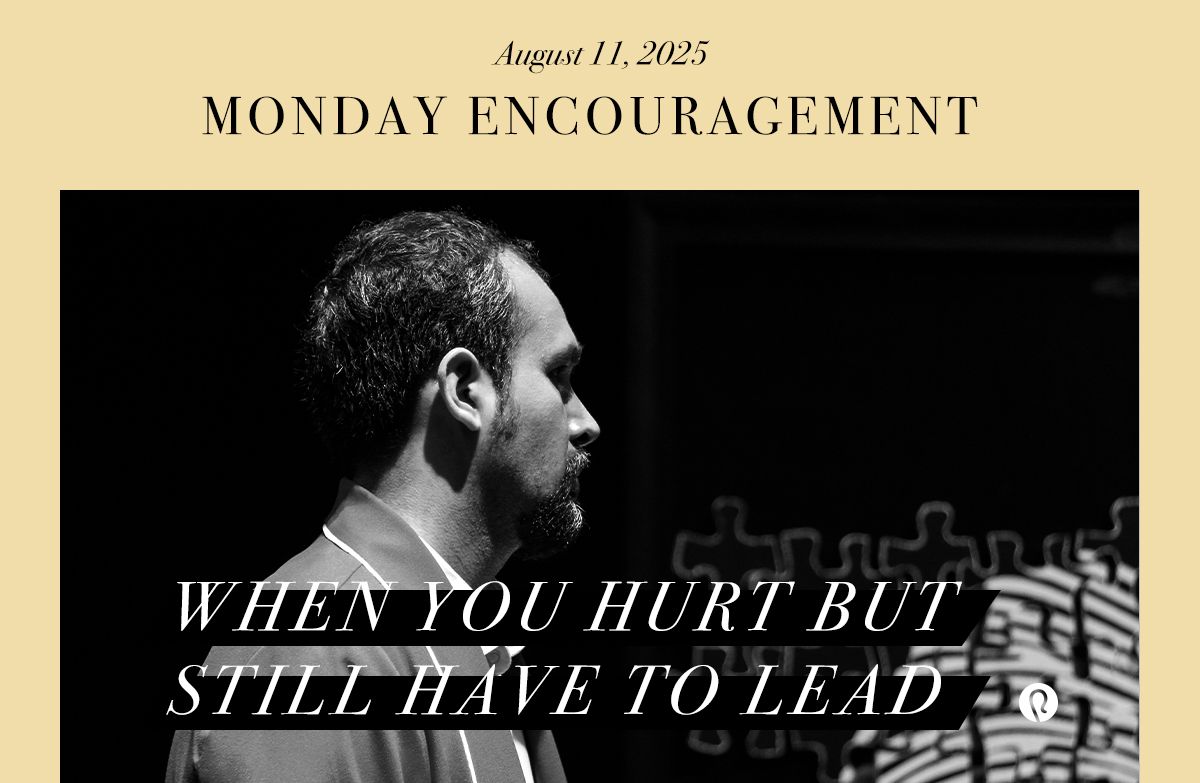When it comes to ministry leadership, I don’t focus on trying to motivate other people. I worry about motivating me, and if I’m motivated it will be contagious. This is true in any area of ministry. Your duty is not necessarily to motivate others. But if you stay motivated, people will catch your enthusiasm. They will catch your vision.
First Corinthians 15:58 says,
“Always give yourself fully to the work of the Lord because you know that your labor is not in vain.” I spend most of the weeks of the year preparing to preach multiple services on the weekend, plus writing and all of the other speaking opportunities that come along. I have to continually come up with material that is fresh and powerful and practical and witty and useful in people’s lives, and that’s a burden, but I manage to stay motivated. This list isn't deeply theological
—it's just practical, usable advice.
1. Put your plans on paper (or on screen).
Dawson Trotman said, ”Thoughts disentangle themselves when they pass through the lips and the fingertips.” If I can say it and I can write it down, then it’s clear. If I haven’t written it down, then it’s vague. A lot of us go around with anxiety which is this free-floating, vague fear that I’m not getting it all accomplished. Just the very fact of putting it down, a lot of times, gives credence and relief to your mind and you’re able to focus on it.
2. Break big tasks into smaller tasks to remove excuses for not starting.
Some tasks are way too big to be chewed on all at once, but you can tackle them like you would eat an elephant
—one bite at a time. When you have a big goal, a big event, or some big project going, break it down into smaller tasks and take them one at a time.
3. Decide how you want to start.
Ask yourself what needs to be done first. If your goal is to make more phone calls and personally invite more people to your church, you probably need to start by writing down the names of people you will contact. Decide what your first, simple step will be.
4. Establish checkpoints in your progress.
Tasks are best accomplished when they have a date attached to them. And today, there are plenty of mobile apps for making lists with reminders built in.
5. Know the difference between "I can't" and "I don't want to."
Be honest with yourself. Sometimes that means you’ve got to get tough. It was Ben Franklin in
Poor Richard’s Almanac who first said, "There is no gain without pain." Most of what’s done in the world is done by people who don’t feel like doing what they’re doing, but they do it anyway. Successful people have developed the habit of doing things unsuccessful people don’t feel like doing.
6. Remind yourself of the benefits of completing the job.
Often in ministry, things become routine and repetitious. In a given week, you may be doing twenty significant tasks that you repeat every week only to start over again. How do you prevent the feeling of mundane from setting in? You remind yourself of how it's going to feel when you're done.
7. Do a small part of it right now.
When I have a big project or task I need to accomplish, I just say, “I don’t want to do this, but I’ll give it five minutes.” I sit down and after I get going in it, it’s not as intimidating. Once you’ve gotten the rocket off the launch pad, it gets so much easier.
I’ve written some books. Books are overwhelming, but I give it five minutes. Every book that I’ve ever written, I sat down and wrote, “My next book, by Rick Warren." Sometimes you just have to start.
8. Be optimistic.
I have found this to be so important in accomplishing large amounts of activities, projects, and programs. Optimism creates energy. The person who says, "I can” and the person who says, “I can’t” are both right.
9. Establish an action environment.
When you prepare messages, you need an environment where you can focus at the task at hand. I have my own study area both at home and church. Kay has her own study area too, so we don’t fight over them anymore. We have two desks in one room. I clear everything off the desk when I’m going to study because I don’t want to focus on anything else. Success comes from focusing on one thing at a time.
10. Avoid places where distractions occur.
I don’t do any of my sermon study at the office. The walls are thin there and I can hear everybody having a good time outside and I’m a party animal. I want to have fun! I don’t want to be sitting studying. I want to be out there with people. So I have to study at home to keep myself from having a great time with all these people I love at the office. And they appreciate it too! Then they get their work done.
11. Know your energy patterns and take advantage of peak times.
Some of you are morning people. Some of you are night people. Have you learned that at some points in the day, you are brighter than at other times? There are times when you’re habitually at your best. The only people who are at their best all the time are mediocre people. You need to know when your body clock is geared toward maximum performance and not waste maximum performance on secondary tasks. If your peak time is 10-12 in the morning, don’t read your mail at 10-12. Save those kinds of tasks for times like at the end of the day, or if you’re not good in the morning, read it then. When you are good, make that time your time for ministry and your preparation.
12. Use the stimulation of good news to do extra work.
Somebody will tell me something great that happened and it’s like God shoots another shot of adrenaline in me. All of a sudden, I’ve got a little extra bounce in my step and I try to channel that into ministry.
13. Recognize when indecision is causing inertia.
A lot of procrastination is not really procrastination; it’s indecision. For a lot of pastors, their weekly struggle is, "What am I going to preach on this next week?," which is one of the reasons I preach in series. I only have to make that decision six or seven times a year. “For the next six weeks, we’re going to talk about culture.” Try to lengthen those decision-making periods out. Identify your choices and choose one. Don’t let it sit around.
14. Use visible reminders.
Use post-it notes or the lock screen on your phone to remind you of the big things.
15. Give yourself room to make mistakes.
I give myself the right to make mistakes on any project that I’m doing. Perfectionism produces procrastination. Perfectionism paralyzes us. If it’s worth doing, do it
—whether you do it perfectly or not. There are very few things in this world that are perfect.
16. Don't set goals you don't expect to reach.
Because there’s no motivation in them.
17. Enlist a partner.
If you’ve got a big task to do, always get a partner. Get somebody else to help you out in your ministry. The Bible says in Ecclesiastes 4:12,
“Two are better than one and a three-fold cord is not easily broken.” If you’ve got a big task and it’s up to you, you’ll probably procrastinate. But if you’ve got somebody else and can say, “We’re going to meet and get this thing going”, you’re more likely to get it done.
18. Keep reading to increase your skill.
If I find myself having a hard time being motivated in some area of ministry that I’m called to do, I get a book or magazine that covers that area. If you have a hard time recruiting people to your ministry, go get a book on recruitment and read it. If you’re having a hard time delegating responsibility, get a book.
Remember that
leaders are readers and leaders are learners. There are no great leaders who refuse to learn. And learning sharpens and motivates you to accomplish your next goals.








